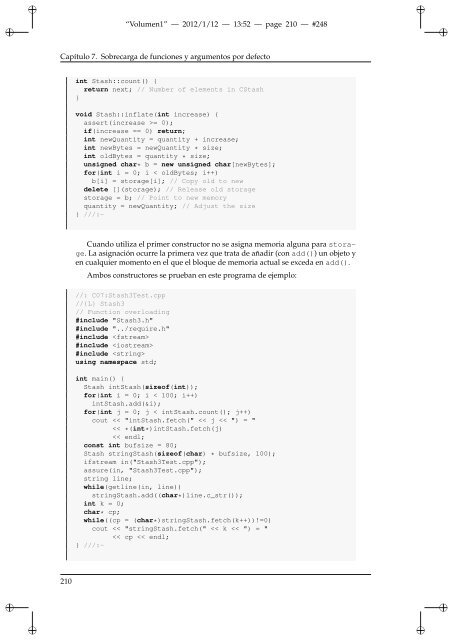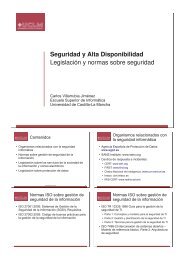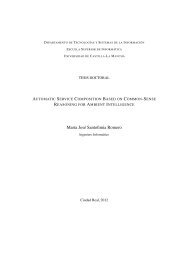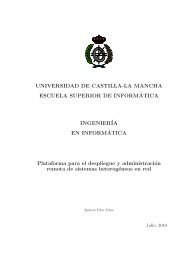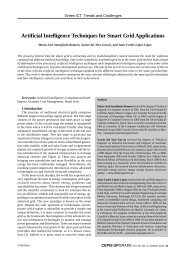Pensar en C++ (Volumen 1) - Grupo ARCO
Pensar en C++ (Volumen 1) - Grupo ARCO
Pensar en C++ (Volumen 1) - Grupo ARCO
Create successful ePaper yourself
Turn your PDF publications into a flip-book with our unique Google optimized e-Paper software.
✐<br />
✐<br />
✐<br />
“Volum<strong>en</strong>1” — 2012/1/12 — 13:52 — page 210 — #248<br />
✐<br />
Capítulo 7. Sobrecarga de funciones y argum<strong>en</strong>tos por defecto<br />
int Stash::count() {<br />
return next; // Number of elem<strong>en</strong>ts in CStash<br />
}<br />
void Stash::inflate(int increase) {<br />
assert(increase >= 0);<br />
if(increase == 0) return;<br />
int newQuantity = quantity + increase;<br />
int newBytes = newQuantity * size;<br />
int oldBytes = quantity * size;<br />
unsigned char* b = new unsigned char[newBytes];<br />
for(int i = 0; i < oldBytes; i++)<br />
b[i] = storage[i]; // Copy old to new<br />
delete [](storage); // Release old storage<br />
storage = b; // Point to new memory<br />
quantity = newQuantity; // Adjust the size<br />
} ///:~<br />
Cuando utiliza el primer constructor no se asigna memoria alguna para storage.<br />
La asignación ocurre la primera vez que trata de añadir (con add()) un objeto y<br />
<strong>en</strong> cualquier mom<strong>en</strong>to <strong>en</strong> el que el bloque de memoria actual se exceda <strong>en</strong> add().<br />
Ambos constructores se prueban <strong>en</strong> este programa de ejemplo:<br />
//: C07:Stash3Test.cpp<br />
//{L} Stash3<br />
// Function overloading<br />
#include "Stash3.h"<br />
#include "../require.h"<br />
#include <br />
#include <br />
#include <br />
using namespace std;<br />
int main() {<br />
Stash intStash(sizeof(int));<br />
for(int i = 0; i < 100; i++)<br />
intStash.add(&i);<br />
for(int j = 0; j < intStash.count(); j++)<br />
cout


